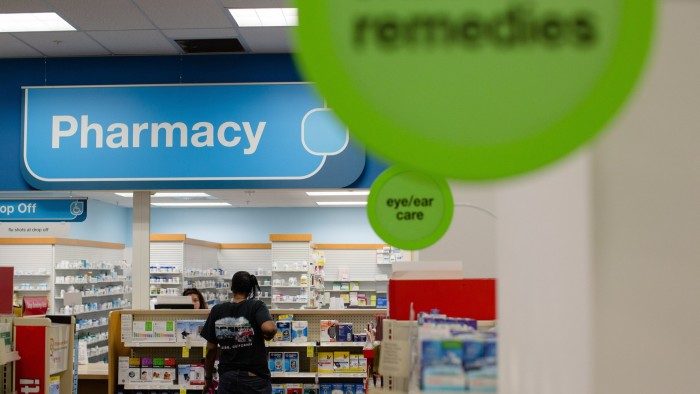Unlock the Editor’s Digest for free
Roula Khalaf, Editor of the FT, selects her favourite stories in this weekly newsletter.
Several of the biggest US pharmacy benefit managers have generated more than $7.3bn in revenue by charging “enormous mark-ups” for drugs treating cancer and HIV, according to the US Federal Trade Commission.
A report published by the competition regulator on Tuesday named CVS Health’s Caremark, Cigna’s Express Scripts and UnitedHealth Group’s Optum, which administer about 80 per cent of all prescriptions in the US.
Pharmacy benefit managers, or PBMs, act as middlemen within the pharmaceutical industry. They negotiate rebates from wholesale prices with drugmakers, before passing some of the discount on to consumers and pocketing the rest as profits.
FTC chair Lina Khan has focused heavily on PBMs during her tenure, a hot-button issue in a country that has long grappled with healthcare affordability.
The antitrust regulator found the three PBMs between 2017 and 2022 marked up “numerous” speciality generic drugs distributed at their groups’ own pharmacies by thousands of per cent.
The companies “hiked costs for a wide range of life-saving drugs, including medications to treat heart disease and cancer”, Khan said.
CVS Health said it was “inappropriate and misleading” for the FTC to “draw broad conclusions from cherry-picked ‘speciality generic’ outliers”. Optum said it was “lowering the cost of speciality medications” and that it was supporting patients with complex and rare conditions. UnitedHealth did not immediately respond to a request for comment.
The FTC sued the three PBMs in September, alleging they favoured higher-priced insulin that would result in higher rebates and fees for themselves.
The latest report builds on a study the agency published in July, which found that PBMs inflated drug prices at the expense of pharmacies and patients. It found that pharmacies associated with Caremark, Express Scripts and Optum received 68 per cent of the dispensing revenue generated by speciality drugs in 2023, up from 54 per cent in 2016.
The FTC on Tuesday said commercial prescriptions dispensed by pharmacies affiliated with the three PBMs were marked up more than $1,000 per prescription compared with unaffiliated pharmacies.
It also argued that the companies generated an estimated $1.4bn of income by billing their plan sponsor clients more than they reimbursed pharmacies for drugs.
The “problem is growing at an alarming rate, which means there is an urgent need for policymakers to address it”, said Hannah Garden-Monheit, director of the FTC’s office of policy planning.
“The FTC should keep using its tools to investigate practices that may inflate drug costs, squeeze independent pharmacies, and deprive Americans of affordable, accessible healthcare — and should act swiftly to stop any illegal conduct,” Khan said.
Khan, whose term has already expired, has not announced her departure but is expected to step down. President-elect Donald Trump, who will take office on January 20, has nominated his own FTC chair.
Additional reporting by Oliver Barnes
Read the full article here

